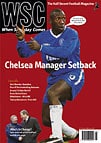 The retirement at 27 of the former Republic of Ireland starlet leaves Dave Hannigan wondering how someone so injury-prone and arrogant could be strangely likeable
The retirement at 27 of the former Republic of Ireland starlet leaves Dave Hannigan wondering how someone so injury-prone and arrogant could be strangely likeable
Nothing became Keith O’Neill quite like the manner of his leaving. The last line of the statement he issued when announcing his departure from Coventry City last October read: “I retire content that I have had the opportunity to play football for the greatest nation in the world.” Thirteen times he represented Ireland and on 25 more occasions he pulled out of the squad through injury. His parting shot (did the football world really need an official press release about his status?) was so grandiose it was actually charming, and arguably the perfect metaphor for the 27-year-old’s career. O’Neill always talked a lot better game than his injury-prone body ever allowed him to play.
It wasn’t one of the more seismic Saturday afternoons in Irish sporting history, but some of us hold fond memories of an outing to Giants Stadium in New Jersey on June 15, 1996. While England and Scotland squabbled a few thousand miles away at Wembley in some obscure European competition, we saw an experimental Mick McCarthy outfit dismantle Bolivia 3-0 in the US Cup and left muttering the name of a flash, black-haired youngster. Two fine goals capped an energetic display by the 19-year-old Dubliner that seemed to presage great things for him and the team.
It wasn’t to be. Sadly, the only thing O’Neill will really be remembered for by Ireland fans is a bit part in the concession of a last-minute equaliser to Macedonia in October 1999 that cost the country direct qualification for Euro 2000. O’Neill’s crime was to slip as a corner came over and to be lying on the floor when Goran Stavreski headed the ball past Alan Kelly. McCarthy has always claimed he didn’t blame O’Neill for what happened in Skopje, but tellingly he never picked the midfielder in an Ireland squad again. This wasn’t how we expected this particular international career to pan out.
With apologies in advance to Norwich City fans appalled by his arrogance (telling an interviewer the only good thing to come out of Norwich was the road to London will earn somebody a reputation), and those at Middlesbrough and Coventry who may have regarded him as some sort of medical freak, O’Neill will be remembered fondly by the journalists who covered Ireland in the late Nineties. For very selfish reasons. In a squad containing some of the unhappiest young millionaires in world football – step forward sultan of sulk David Connolly, or, to review the line-up of hacks before deigning to enter a press conference, surly Robbie Keane – O’Neill actually appeared to be enjoying himself.
Who else would respond to a question about the travails of becoming famous with an answer that it wasn’t his fault he was so good-looking? With a straight face he went on to ask what exactly the begrudgers wanted him to do: “Slash my own face with razor blades?” So rare for somebody in the modern era, he gave the impression that he fully understood getting paid ridiculous sums of money to play football for club and country should be considered fun. Of course, at times it may have been too much fun – O’Neill and the word model appearing in the same sentence far more than O’Neill and the word goal – and you can only get away with that sort of thing when you are in the team playing.
That O’Neill managed just 122 first-team appearances over the course of a decade since making his debut for Norwich at 17 tells its own story. The litany of injuries included many that stemmed from a childhood spinal condition called spondylosis but, just to sum up how star-crossed he became, he fractured his hand hitting a punchbag at a fairground during his time at Highfield Road. Hardly the way to endear yourself to fans already wondering how one player could be out injured so often.
The worst part about this is that he could actually play. In the build-up to Euro 2000, at a time when England were woefully short of southpaws, a couple of the broadsheets lamented his nationality after seeing him impress at left wing-back for Middlesbrough. That may have been the last time he ever figured prominently in the national press. Well, apart from out-takes from an interview he gave following his retirement in which he confessed to not being worried about the future because “the world is my lobster now”. The world is my lobster? We can only surmise the road to London took him through Del Boy’s Peckham.
From WSC 207 May 2004. What was happening this month